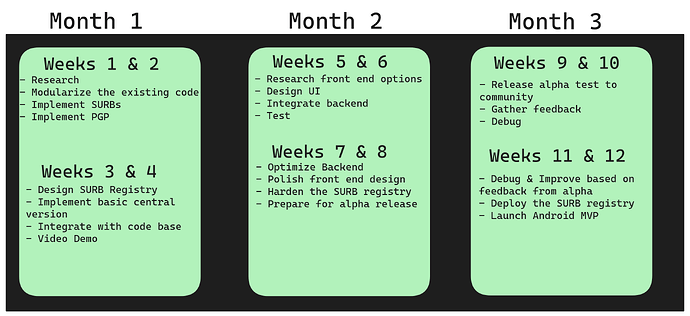General
NymCHAT is an app that enables users to send fully anonymous encrypted messages by leveraging Nym’s Mixnet with a Public “Dead Drop” SURB Registry.
In this 12 week project, I will deliver a functional android application MVP that allows users to send and receive fully encrypted messages anonymously. I have already begun development, with a working prototype on github: GitHub - code-zm/nymChat: Python Messaging Client for secure communication through the Nym Mixnet.
I require little to no assistance but I am open to collaboration. It would be beneficial to be bouncing ideas off of an expert on the team to ensure I make the proper design decisions. I can do all the heavy lifting.
Problem it Solves
This project addresses the need for a truly secure, anonymous messaging platform. With a free & open source app leveraging Nym’s Mixnet, users around the world will be able to communicate privately.
Developer
code-zm (23 years old, USA, software developer, undergraduate cybersecurity student)
Plan
Costs
Undergraduate Developer Salary: ~30 Hours/week @ $20/hour for 12 weeks
- $7,200 USD (~72,000 NYM) ($2,400/month)
SURB Registry Remote Hosting + Protections
- $150 USD (~1,500 NYM)
TOTAL: $7,350 USD (~73,500 NYM)
Benefits for NYM
This project will serve as a showcase of Nym’s Mixnet technology by expanding it’s use case to messaging. It will highlight one of the many real world application’s of Nym’s technology, attracting new community members, privacy advocates, developers, and investors in the process.
Most importantly, it will provide true anonymous communication. This will empower people with privacy in a world where surveillance and censorship is rampant. This system could provide a safe haven for activists, journalists, and the average person who cares about their online privacy.
Future Development
Following the successful delivery of the Android version, I will apply for another grant to develop the iOS version as well as extending the app’s capabilites. Future updates could include a decentralizing the SURB registry, groupchats, file sharing, integration with NymVPN, etc.
Feel free to ask any questions, thanks!
code-zm


